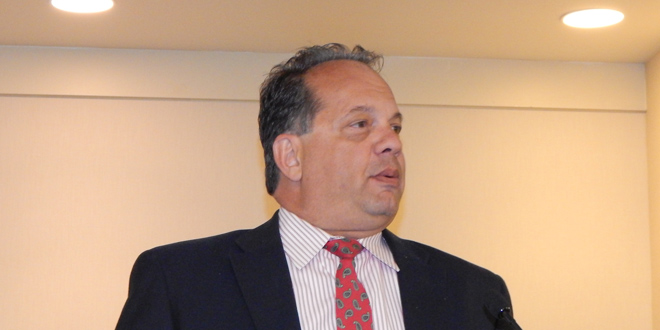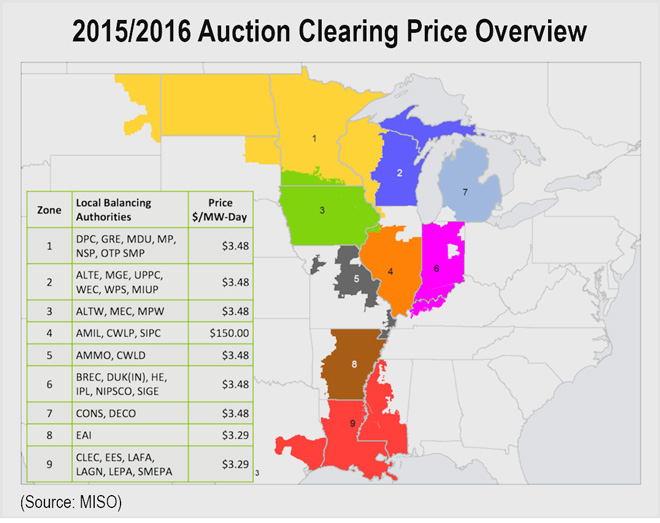By Chris O’Malley
A consumer group and the Illinois Attorney General have asked the Federal Energy Regulatory Commission to launch an investigation into whether Dynegy illegally manipulated MISO’s Planning Resource Auction last April, resulting in a nine-fold price increase in Zone 4.
Public Citizen Inc. also alleged that MISO brushed aside recommendations by its staff that Zones 4 and 5 be merged due to their concerns about Dynegy’s growing share of capacity in Zone 4 after the company acquired four generators in the zone from Ameren. MISO didn’t want to risk Dynegy leaving for neighboring PJM, Public Citizen alleges.
Its complaint (EL15-70), filed Thursday, is the most serious volley yet by consumer interests still simmering over April auction results that saw prices in Zone 4, comprising much of Illinois, clear at $150/MW-day, compared with just $16.75 a year earlier.
The result will raise annual electric bills of Ameren Illinois residential customers by more than $140, the complaint states.
Illinois Attorney General Lisa Madigan filed a similar complaint Thursday, arguing that the 800% jump in Zone 4 prices is unjust and unreasonable and that the Dynegy acquisition made it a “pivotal supplier” in the zone.
“If Dynegy-controlled generation capacity physically located within Zone 4 is not bid, there would be insufficient capacity in Zone 4 to clear its local clearing requirement,” Madigan said. “Thus, Dynegy is able to set the price for the marginal clearing capacity, regardless of its internal cost of providing that capacity. If there were no pivotal supplier, one would have expected the Zone 4 price to match the result in Zones 1 through 7.”
Madigan also noted that in approving the Dynegy acquisition, FERC declined to look at its effect on competition and prices in Zone 4 and instead only considered a competitive analysis of MISO as a whole.
MISO had told Illinois officials that the auction was the result of market dynamics, not improper conduct. (See MISO: Nothing Amiss in High Illinois Capacity Prices.)
Public Citizen’s complaint suggests Dynegy could have inflated prices by either not offering some capacity or by offering some of it at such a high price that it would not clear.
Dynegy issued a statement saying it “follows and respects all the rules, tariffs and obligations in the markets and areas where we operate.”
“Dynegy offered all of its megawatts into the MISO auction with no physical or economic withholding in accordance with MISO tariffs and as approved by the Independent Market Monitor,” Dynegy said. “MISO’s Independent Market Monitor has publicly stated that ‘the auction results are reliable and participants’ behavior was in line with all tariff rules and procedures.’”
Spokesman Micah Hirschfield declined to comment on the price of the company’s offers. “As noted in the statement, our bids were approved by the Independent Market Monitor and within the rules and tariffs of MISO,” he said.
MISO said Friday that it is reviewing the complaint and will respond in the FERC proceeding.
Investigation Sought
Public Citizen alleges the auction results “may be the result of illegal manipulation and gaming of the auction bidding process, specifically capacity withholding” contrary to Section 222 of the Federal Power Act.

The Public Citizen complaint does not explicitly accuse Dynegy of withholding capacity, but says it was in a unique position to do so after its 2013 acquisition of four coal-fired plants totaling 3,150 MW in Zone 4. That gave Dynegy control of eight generating plants in Zone 4 with a capacity of 6,000 MW.
Dynegy has acknowledged that it cleared 553 MW in Zone 4 in addition to 1,709 MW committed to retail load obligations. (See Cornucopia of Capacity at MISO Auction, but Famine Could Follow as Coal Plants Retire.)
“Because MISO has no plans to make company-specific bids public, we cannot know for sure how much of the several thousand of megawatts Dynegy owns in Zone 4 it bid, how much couldn’t be bid due to contract obligations, or how much it withheld from bidding altogether,” the complaint says.
Public Citizen said that the Ameren acquisition raised red flags for MISO staffers. It cited minutes from a 2014 MISO Loss of Load Expectation Working Group in which Zheng Zhou, manager of economic studies, purportedly stated that staff “are concerned with Dynegy’s offer strategy in the next Planning Resource Auction as they [Dynegy] are now the dominant provider of capacity in the zone.”

Mark Volpe, Dynegy’s senior director of regulatory affairs, speaking at Infocast’s MISO Market Summit in Indianapolis Thursday
In early 2014, MISO staff proposed merging Zone 4 and Zone 5 to blunt Dynegy’s newfound dominance. The proposal to merge zones failed, “under stiff resistance from Dynegy,” the complaint states. Specifically, it points to a June 2014 meeting of MISO’s Supply Adequacy Working Group, on which Dynegy Senior Director of Regulatory Affairs Mark Volpe served as vice chair.
“His role and the role of other powerful utility and financial stakeholders in the auction’s design and coordination do not lend credibility to the auction process and cry out for FERC review of the auction results under Section 206 at least.”
Volpe declined to comment Friday.
The consumer group alleges Dynegy “had financial incentive to intentionally withhold capacity” by either refusing to offer some units for bid or offering them at high prices with a low likelihood of clearing so as to drive up auction prices.
A UBS analyst estimated that a withholding strategy would generate about $5 million in earnings before interest, taxes and amortization (EBITA) for every 100 MW cleared at auction. In April a Dynegy spokesman said the company expected to make about $30 million out of the auction.
MISO Beholden to Members?
The complaint claims Dynegy used strong-arm tactics to manipulate MISO, threatening that if MISO did not adopt capacity market rules that were similar to PJM’s, Dynegy would part ways with MISO and join PJM. (See Dynegy: Change MISO Capacity Rules or We’ll Join PJM.)
“This fundamental flaw exposes MISO’s political science problem: FERC has placed a private organization in charge of developing power markets, and that organization’s insecurity about member flight results in decisions about rate structures … driven primarily by the need to retain membership, thereby prioritizing power generator profits at the direct expense of consumers,” the group said.
Last month the Chicago-based Citizens Utility Board called for a federal investigation of the auction results, citing significant rate hikes for downstate Illinois Ameren customers.
FERC Split over Previous Auction Challenge
Public Citizen may find at least a couple of allies in its request to reopen the auction results.
In September, a shorthanded FERC split 2-2 over whether it should reject the results from the ISO-NE’s February 2014 auction due to unchecked market power.
Republican Tony Clark and Democrat Norman Bay called for FERC to reject the auction results, but then-Chairman Cheryl LaFleur and Republican Philip Moeller said the commission should seek only prospective changes in the auction rules. Because of the 2-2 deadlock, the 2017-18 auction results “became effective by operation of law.” (See Congressional Meeting Fails to Sway LaFleur on Capacity Results.)
The RTO’s eighth Forward Capacity Auction (FCA) resulted in a sharp price increase after nearly 3,000 MW of capacity submitted retirement requests. Fearing they would have less capacity offered than required, ISO-NE officials applied administrative price rules to the auction.
Since the September vote, Bay has ascended to chairman and former Arkansas regulator Collette Honorable has joined the commission. Moeller’s term expires in June.
Court Ruling
Public Citizen’s complaint cites an April 29, 2015, opinion by the Ninth Circuit Court of Appeals, California v. Harris, that it said found that electric market rates, such as the Planning Resource Auction results, must be reviewed after-the-fact as well as in advance to determine whether they actually produce just and reasonable rates.



